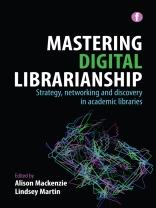This book examines the changing roles of the librarian and how working within a rich digital environment has impacted on the ability of professionals to develop the appropriate ‘know how’, skills, knowledge and behaviours required in order to operate effectively.
Expert specialists and opinion-makers from around the world discuss the challenges and successes of adapting existing practices, introducing new services and working with new partners in an environment that no longer recognizes traditional boundaries and demarcation of roles.
The book is structured thematically, with a focus on three key strands where the impact of digital technologies is significant:
- Rethinking marketing and communication – this strand looks at strategic approaches and practices which harness social media and illustrate the importance of communication and marketing activities in these new online spaces.
- Rethinking support for academic practice – this part examines the professional expertise required of librarians who engage with and support new academic and learner practices in digitally rich teaching, learning and research environments.
- Rethinking resource delivery – this section investigates the use of strategies to maximize access to online resources and services: harnessing system data to enhance collection management and user choice, designing and managing mobile ‘friendly’ learning spaces and providing virtual resources and services to an overseas campus.
Readership : This timely and inspiring edited collection should make vital reading for librarians, library schools, departments of information science and other professional groups such as education developers, learning technologists and IT specialists.
Содержание
THEME 1: RETHINKING MARKETING AND COMMUNICATION
1. Digital marketing in an outreach context — Alison Hicks 2. Reference 2.0: evolution of virtual reference services and social media — Dawn Mc Loughlin and Jill Benn 3. A service in transition: how digital technology is shaping organizational change — Rachel Bury and Helen Jamieson
THEME 2: RETHINKING SUPPORT FOR ACADEMIC PRACTICE
4. The impact of open and digital content on librarians’ roles in a learning and teaching context — Helen Howard 5. Supporting early-career researchers in data management and curation — Joy Davidson 6. Extending students’ digital capabilities: the Digital Tattoo Project — Julie Mitchell and Cindy Underhill
THEME 3: RETHINKING RESOURCE DELIVERY
7. Mobilizing your library — Dr Kay Munro, Karen Stevenson, Rosemary Stenson and Wendy Walker 8. ‘You might also be interested in . . .’: improving discovery through recommendations — Lisa Charnock and Joy Palmer 9. Libraries and international branch campuses in the digital environment — Moira Bent
Об авторе
Alison Mackenzie is the Dean of Learning Services at Edge Hill University. Prior to taking up this post, she held the post of University Librarian at Bangor University, Wales, had a variety of roles at Manchester Metropolitan University and in her early career worked in art colleges and commercial practice. Alison has been active in SCONUL for a number of years, as a member and Chair of the Working Group on Information Literacy and as a contributor to the e-learning task-and-finish group. She has been active in the promotion of digital literacies and is currently managing a project on behalf of SCONUL on the development of digital scholarship skills by information professionals. She is currently Chair of the Performance Measurement and Quality strategy group. Lindsey Martin is the Assistant Head of learning Services at Edge Hill University, responsible for the learning technologies managed and supported by Learning Services. She has overall responsibility for the virtual learning environment and its associated systems, media development, classroom AV and ICT support and ICT staff development. Lindsey has worked in academic libraries for the past 19 years in a variety of roles including liaison librarian, research coordinator and manager of SOLSTICE, Edge Hill’s HEFCE funded Centre of Excellence for Teaching and Learning. She first became involved with e-learning as an academic librarian creating e-learning modules to support colleagues and students developing information and digital literacies. Lindsey is a member of the editorial board for the SCONUL Focus journal and secretary of the Heads of e Learning Forum Steering group (He LF).












